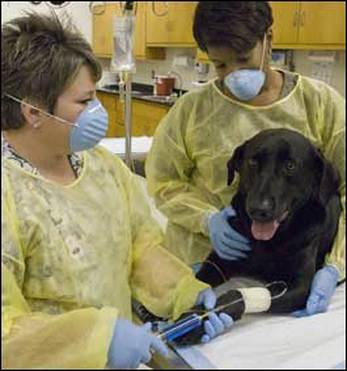 Humans with terminal cancers or with widespread metastases are offered treatment with the hope of an extended lifespan, despite a grim prognosis. People are routinely administered second, third, fourth, and beyond treatment plans when they fail to respond to the frontline therapies. This is done with little to no evidence-based information that would suggest such interventions will actually result in a positive outcome. The benefit of aggressive therapy in patients with terminal cancers is poorly described. The American Society of Clinical Oncology (ASCO) identified chemotherapy use among patients for whom there was no clinical value as “the most widespread, wasteful, and unnecessary practice in oncology.” When I read those words as a veterinary oncologist, I had only one thought. Ouch. The majority of patients I treat with cancer will ultimately succumb to their disease. Pets are typically diagnosed at an advanced stage of disease, and a cure is nearly impossible. We also accept much lower rates of toxicity with our chemotherapy protocols than our human counterparts; therefore, with good reason, we can’t treat animals’ cancers to the “fullest potential.” I would estimate that the premise of treatment for greater than 90% of cases I see is rooted in palliation (i.e., relief from pain) rather than a true belief of cure. Yet, veterinary oncology is fundamentally based on principles of human oncology. So if the data for human oncology tells us that the treatment of terminally ill cancer patients is not only poorly beneficial but also wasteful (in terms of not only finances but resources), how can I justify the recommendations I make each day? The answer is simple: Veterinary oncology is premised on the idea of treatment making our patients feel better, not worse. Rarely are animals diagnosed with cancer incidentally. Most show some sort of clinical signs prior to their diagnosis of cancer. Treatment, therefore, is aimed at relieving such signs and returning their quality of life to their baseline level. A study recently published in the Oncology edition of the Journal of the American Medical Association examined the evaluation of the use of chemotherapy and quality of life for people with end-stage cancer. Specifically, researchers were interested in knowing whether chemotherapy had a positive or detrimental effect during the last week of life for human patients with cancer, and if the effect was dependent on the patient’s overall health status prior to treatment. In people, performance status is used to evaluate a patient’s quality of life. There are several different scoring systems, with the Eastern Cooperative Oncology Group (ECOG) being widely accepted and outlined as follows: In the aforementioned study, a patient’s quality of life near death (QOD) was measured using a validated caregiver’s rating of their mental and physical distress during their final week of life. Results from the study raise several interesting points:
Despite the shared foundation of human and veterinary oncology, there is an enormous disparity between the end goals of each discipline. Human oncology is based on the concept of treating patients with the mantra of “life at all costs,” while veterinary oncology accepts our limitations, choosing to “maintain or improve quality of life” over cure. This is the message I attempt to relay during each new consultation I see. This is the information I am passionate about dispersing with my written and spoken dialogue each day. This is why I work so hard to help animals and their owners at every possible junction I am afforded. The battle to dispel the misconceptions about cancer care in animals is never-ending but worth enduring, knowing I can make a difference if even for just a few. Especially if the few are those who feel the “ouch” factor mentioned above just a bit deeper than all the others. Source: Pet MD / Dr. Joanne Intile A Peaceful Farewell provides compassionate at home pet euthanasia to fellow pet owners in Chandler, Gilbert, Mesa, Tempe, Ahwatukee, Scottsdale, and most of the Greater Phoenix Metropolitan Area.
0 Comments
Leave a Reply. |
The PAW Blog...
For the LOVE of Pets The goal of this blog is to help educate pet owners by sharing pet health facts and pet news articles...and ... sometimes put a smile on your face with a cute or funny pet story! Categories
All
Archives
July 2024
Search for any topic...
|

 RSS Feed
RSS Feed

